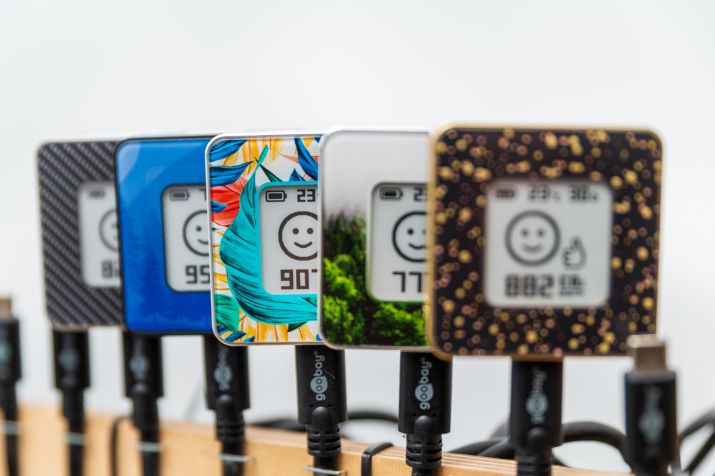|
Ventspils company Aspired has started to offer clients around the world a pocket-sized portable air quality, humidity, and temperature sensor called Airvalent, which can be used at home or in the office. Eduards Perkons, the Sales and Marketing Manager of the company, explains that many do not even realize how much the quality of air indoors can affect one's well-being, cognitive abilities such as perception, attention, memory, and work capacity. CO2 levels are measured in parts per million (ppm). Outdoors, in fresh air, CO2 levels are usually around 300–400 ppm, and in well-ventilated rooms – around 500–600 ppm. The optimal CO2 level is up to 1000 ppm. Exceeding this, drowsiness and a decrease in cognitive abilities can occur. Above 1500 ppm, a person may start to feel quite uncomfortable, and if the CO2 concentration exceeds 2000 ppm, headaches, loss of concentration and attention, increased heart rate, and other problems may arise. Elevated CO2 levels also impact sleep quality and can contribute to respiratory diseases. If the CO2 indicator exceeds 2000 ppm, it is already a critical threshold, but between 1000 and 2000 ppm, one should consider ventilation, Eduards Perkons emphasizes.
Aspired representatives have experienced this in practice at the world's largest technology exhibition GITEX Global in Dubai, United Arab Emirates, where the company was able to participate in the Latvia stand, thanks to the support of the Latvian Investment and Development Agency, presenting their new product to the market very recently. Starting work in the huge hall, the sensor recorded a normal CO2 level, but after a few hours, as people began to feel drowsy and tired, it was seen that the indicator had risen above the norm and was between 1500 to 1900 ppm. In such situations, to maintain alertness, coffee will not help – ventilation is necessary. The product created in Ventspils combines high technology with design. It is developed and also assembled in Ventspils. Currently, the air sensors are being manufactured at the Ventspils High Technology Park, but by the end of this year, the company will move to a new production building on Ganību Street. Currently, the company employs more than 20 people, but the number will increase as production expands. Airvalent is different from similar products because it is the world's smallest – it is a compact pocket-sized device that fits comfortably in the palm and is easy to carry and use, for example, at home or in the workplace. The device has a battery that needs to be charged approximately every 20 days. Airvalent has a built-in NDIR sensor, which provides high measurement accuracy. The device's case is made of aluminum, which is the most environmentally friendly solution. "It was important for us to use as few petroleum products as possible – we also think about sustainability," says Pērkons. Similar products have cases made of plastic. The case is available in three colors: black, gold, and silver. The client can choose from one of the already available – currently 45 – screen protector designs according to their home decor or personal taste. However, the screen protector can also be personalized, for example, with a company logo, as has already been done by the well-known Ventspils manufacturing company Bucher Municipal. The sensors can also be used as a corporate gift from the company. Along with the product, a mobile application has been developed that works on both Android and iOS operating systems. It can be downloaded for free on the phone. With the help of the application, it is possible to monitor the device's operation and change settings, for example, how often the sensor will read data. The standard interval, which ensures optimal battery use, is five minutes, but the interval can be set from one to even 15 minutes. Not only the screen protector but, using the application, also the sensor screen view can be personalized. Since people perceive information differently, the company has prepared ten possible screen views, from which the client can choose the most suitable for themselves and their perception. The app's settings also allow choosing how the sensor will notify about reaching an elevated CO2 level. Currently, products manufactured in Ventspils can be purchased on the product website airvalent.com, as well as in online stores in Latvia, Estonia, Finland, and Lithuania. Presenting the new sensors at exhibitions in Riga and Dubai, good feedback has been received, and new collaborations have started. Several large international companies have already shown interest in the Airvalent sensors, which is a strong affirmation for the Ventspils company. The potential of these sensors is significant, not only for individual use but also for integration into smart home systems or larger building management systems. Several copies of the new product were also bought. Eduards Perkons emphasizes that the new product is mainly intended for the American and German markets, where customers value personalization and where households use a lot of gas for cooking, which significantly worsens air quality. Originally the material was published in the newspaper "Ventas Balss" and website www.ventasbalss.lv. Article made by Kristine Dulbinska. Photo made by Krists Kula. Comments are closed.
|
Connect & Follow
|
FOLLOW US ON:
|
CONTACT US:
|
© 2023 Invest in Ventspils


